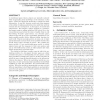Free Online Productivity Tools
i2Speak
i2Symbol
i2OCR
iTex2Img
iWeb2Print
iWeb2Shot
i2Type
iPdf2Split
iPdf2Merge
i2Bopomofo
i2Arabic
i2Style
i2Image
i2PDF
iLatex2Rtf
Sci2ools
SIGECOM
2006
ACM
2006
ACM
Playing games in many possible worlds
In traditional game theory, players are typically endowed with exogenously given knowledge of the structure of the game—either full omniscient knowledge or partial but fixed information. In real life, however, people are often unaware of the utility of taking a particular action until they perform research into its consequences. In this paper, we model this phenomenon. We imagine a player engaged in a questionand-answer session, asking questions both about his or her own preferences and about the state of reality; thus we call this setting “Socratic” game theory. In a Socratic game, players begin with an a priori probability distribution over many possible worlds, with a different utility function for each world. Players can make queries, at some cost, to learn partial information about which of the possible worlds is the actual world, before choosing an action. We consider two query models: (1) an unobservable-query model, in which players learn only the response to their own...
| Added | 14 Jun 2010 |
| Updated | 14 Jun 2010 |
| Type | Conference |
| Year | 2006 |
| Where | SIGECOM |
| Authors | Matt Lepinski, David Liben-Nowell, Seth Gilbert, April Rasala Lehman |
Comments (0)

